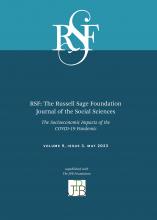Abstract
The COVID-19 pandemic and resulting economic crisis exposed the U.S. rental housing market to extraordinary stress. Policymakers at the federal, state, and local levels established eviction moratoria and a number of additional direct and indirect renter-supportive measures in a bid to prevent a surge in evictions and associated public health risks. This article assesses the net efficacy of these interventions, analyzing changes in eviction filing patterns in 2020–2021 in thirty-one cities across the country. We find that eviction filings were dramatically reduced over this period. The largest reductions were in places that previously experienced highest eviction filing rates, particularly majority-Black and low-income neighborhoods. Although these changes did not ameliorate racial, gender, and income inequalities in relative risk of eviction, they did significantly reduce rates across the board, resulting in especially large absolute gains in previously high-risk communities.
- © 2023 Russell Sage Foundation. Hepburn, Peter, Jacob Haas, Nick Graetz, Renee Louis, Devin Q. Rutan, Anne Kat Alexander, Jasmine Rangel, Olivia Jin, Emily Benfer, and Matthew Desmond. 2023. “Protecting the Most Vulnerable: Policy Response and Eviction Filing Patterns During the COVID-19 Pandemic.” RSF: The Russell Sage Foundation Journal of the Social Sciences 9(3): 186–207. DOI: 10.7758/RSF.2023.9.3.08. Support for the Eviction Tracking System is provided by the Russell Sage Foundation, the C3.ai Digital Transformation Institute, and the Pew Charitable Trusts. The Eviction Lab is supported by the JPB and Bill & Melinda Gates Foundations, the Chan Zuckerberg Initiative, and the Eunice Kennedy Shriver National Institute of Child Health & Human Development of the National Institutes of Health (NIH) under Award No. P2CHD047879. Direct correspondence to Peter Hepburn, at peter.hepburn{at}rutgers.edu. 618 Hill Hall, 360 Dr. Martin Luther King Jr. Blvd., Newark, NJ 07103, United States.
Open Access Policy: RSF: The Russell Sage Foundation Journal of the Social Sciences is an open access journal. This article is published under a Creative Commons Attribution-NonCommercial-NoDerivs 3.0 Unported License.






